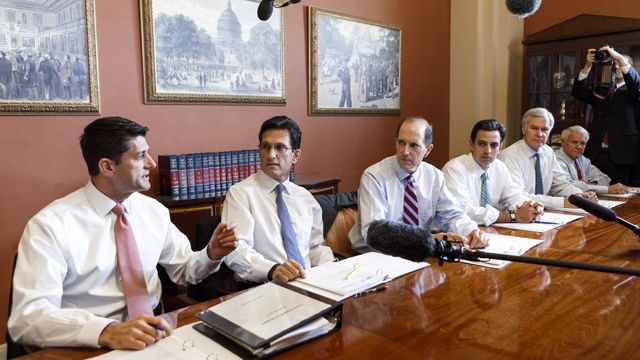
Never before has a minority party linked controversial legislative demands with a threat to shut down the government or imperil the global economy. But House Republicans would have you believe otherwise.
In an op-ed in The Wall Street Journal this morning, Rep. Paul Ryan writes that president Obama “says he ‘will not negotiate’ on the debt ceiling. He claims that such negotiations would be unprecedented. But many presidents have negotiated on the debt ceiling—including him. ”
Ryan was referring to a speech given in September before the Business Roundtable — an association of CEOs of large US companies — in which the president said, “You have never seen in the history of the United States the debt ceiling or the threat of not raising the debt ceiling being used to extort a president or a governing party, and trying to force issues that have nothing to do with the budget and have nothing to do with the debt.”
Ryan continued: “He’s refusing to talk, even though the federal government is about to hit the debt ceiling. That’s a shame — because this doesn’t have to be another crisis. It could be a breakthrough.”
But that’s spin: Negotiating would set a dangerous precedent, because Obama’s right that this time really is different. Here are three reasons why.
1. Republicans are testing a new strategy of refusing to negotiate until crisis point
Republican lawmakers such as Ryan push the narrative that Democrats and the president won’t negotiate — but in fact, as Alex Seitz-Wald writes for the National Journal, Democrats requested a conference on the budget with Republicans 19 times between April and October. Republicans blocked all 19 requests. Now that the government is in crisis, Republicans say they want to negotiate, hoping that Democrats feel backed into a corner. But Democrats know that if they accept that paradigm, they’ll be right back in that corner in a few month’s time.
2. The debt ceiling is becoming a more common, and more dangerous, negotiating tool
John Boehner recently claimed that linking the budget to the debt ceiling (and thereby risking default if budget negotiations get ugly) is routine. This, in fact, is not true, writes Richard Kogan, a former Senior Adviser at the Office of Management and Budget. Boehner cited seven debt ceiling increases from Reagan through Clinton tied to budget measures — but, in fact, since Reagan was inaugurated, Congress has rasied the debt ceiling 45 times.
Ryan and others also claim that holding the debt ceiling hostage is something both parties do. Slate’s Dave Weigel runs through why the handful of times Democrats did not quickly give the president a debt limit increase have few parallels to today — in every case, a clean debt ceiling increase got through before the country got close to the impasse we’re at now. Weigel writes:
Raising the debt limit has always been unpopular, and tough to explain to voters. A few times, Democrats balked at raising it for a few days to make a point, then caved in. Many more times, they’ve just voted for the damn thing. John Boehner’s Republicans have only ever agreed to raise the debt limit if they won major policy concessions from the president. Both parties don’t do it. One party does it.
3. Some are actually willing to default
Lastly, this time is different because, for the first time in history, a large contingent of the minority party, The New York Times reports today, “isn’t buying the apocalyptic warnings that a default on United States government debt would lead to a global economic cataclysm.”
“I think we need to have that moment where we realize [we’re] going broke,” Ted Yoho (R-FL) told The Washington Post, arguing for default. “I think, personally, it would bring stability to the world markets.”
The Post’s Ezra Klein called this kind of thinking “terrifying,” writing:
Analogies between the finances of families and government are typically pretty flawed. But there’s one worth drawing here: That moment when a family realizes it’s broke and stops paying their mortgage, credit card bill, etc? It’s not a good moment for them. It’s a moment that wrecks their credit score and makes it harder for them to be “not-broke” ever again. To try and improve the U.S.’s finances by sharply and permanently increasing its borrowing costs is like trying to prove to your sister that her house is a firetrap by actually setting it on fire. But Yoho and friends are getting plaudits from the cramped, closed information loop they favor.
Yoho and like-minded colleagues brought America to one brink — government shutdown — looked over the edge, and then dove right in. The fact that they are willing to approach another with the intention to leap into it is, truly, unprecedented.


